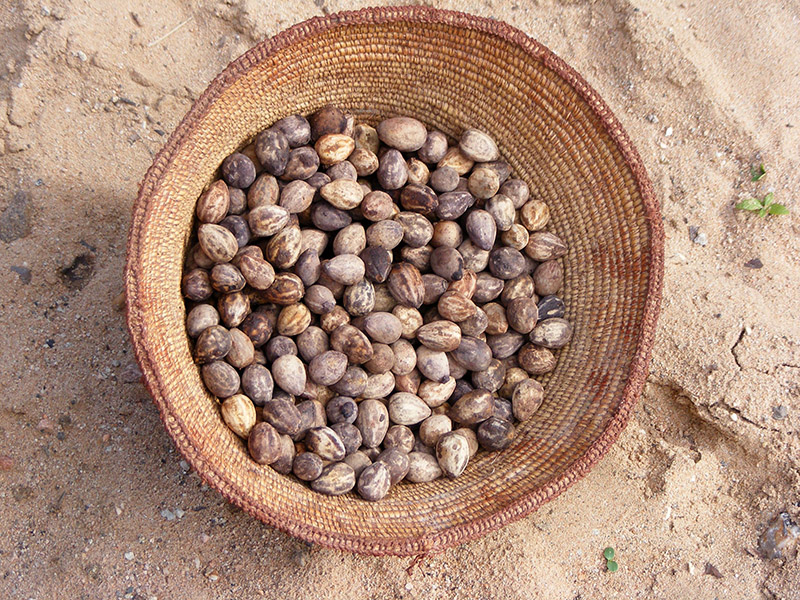
By Ben Bennett
Lipid oils extracted from plants are particularly good for use in cosmetics because they are very stable and can therefore carry other oils without going rancid: which is not a desirable quality in a body butter! Two oils extracted from seeds of sustainably wild harvested plants in Northern Namibia show great commercial promise.
Marula kernel oil from the common fruit tree Sclerocarya birrea, and Ximenia seed oil from the sourplum tree, both have exciting commercial potential as cosmetic oils. Marula oil is high in anti-oxidants. Ximenia oil has particularly long fatty acids which make it 'sticky' and therefore excellent for use in night-creams.
NRI is working with Namibian partner NGOs 'CRIAA SA-DC', 'NNF' and 'IRDNC' using funds from the US Government Millennium Challenge Corporation and with marketing expertise from the regional trade association Phytotrade Africa to develop sustainable value chains for these exciting lipid oils. In 2012 the project helped harvesting groups and associations to find markets for N$332,710 of raw Marula kernel and N$7,685 of raw Ximenia kernels representing and income of about £24,000, mostly for women gatherers. You can now find Marula Kernel oil in many Body Shop products and Ximenia kernel oil in L'Oreal's popular night creams.
This is a good start, but the aim of the project is that, by 2014, the Namibian producer groups will have substantially increased this figure without causing environmental damage, increased the proportion of the final oil value that they retain themselves by processing and are able to manage these export businesses on their own.
This production season the NRI project will focus on three main issues with the harvester and processing groups: increasing the quantity of kernel harvested, improving the quality of exports, and getting the unit price of product down so that these oils can compete with the numerous other lipid oils available to cosmetic companies.
The project has been very successful in stimulating demand for these oils, but, unfortunately this has come at a time of low supply in Namibia due to a combination of frost during flowering and heavy rain during last years harvest season. We are planning to increase our harvesting areas next year.
Managing post-harvest quality for wild harvest fruit among poor and isolated communities presents a new and potentially serious problem. NRI and its partners are training harvesting groups in better handling and storage and Millennium Challenge Account - Namibia (MCA-N) have given special grants for plastic buckets so that women can keep fruit and kernels separately from other farm produce. This appears to be working very well so far.
Dealing with the issue of price is a longer-term challenge. Wild harvested products are sometimes difficult to price because they are, by nature, open-access. The balance of incentives to harvest and incentives to protect the resource is a delicate and complex one. Some of these products have fantastic properties for which companies will pay a premium, but usually there is a substitute available somewhere in the world at a lower price. So, to keep ahead of the curve as far as market share is concerned, Namibian lipid oils need to lower their price whilst maintaining the income that harvesters get to keep them protecting the resource. NRI's strategy is to increase the extraction efficiency and thereby produce more oil from less seed. This sounds easy, but some of these oils are new so no obvious technical solution exists. We will, with help from MCA-N, try out some new approaches in the coming harvest season.
So keep an eye out on the ingredients lists for your cosmetics products. If all our plans work you will find a lot more items with lipid oils from the Marula and Ximenia trees.

